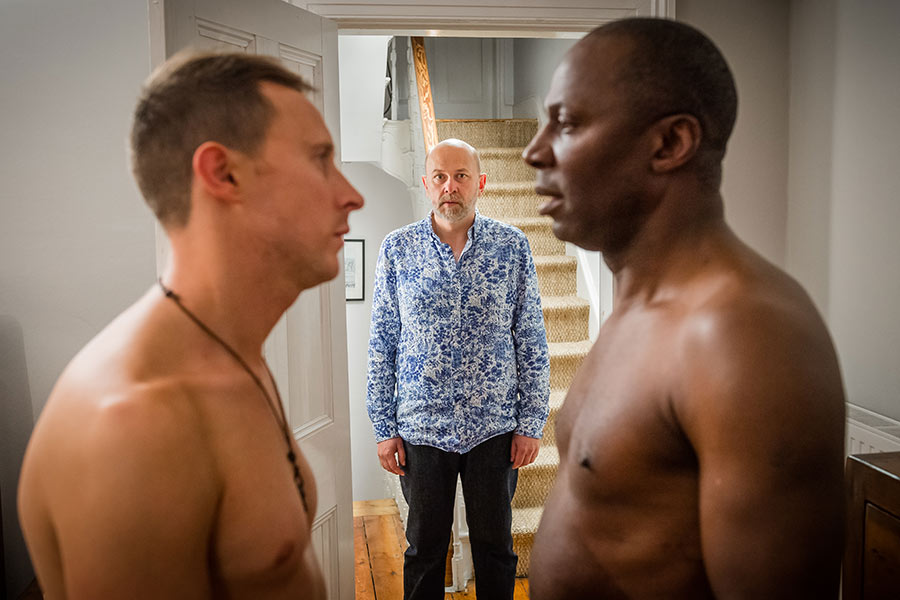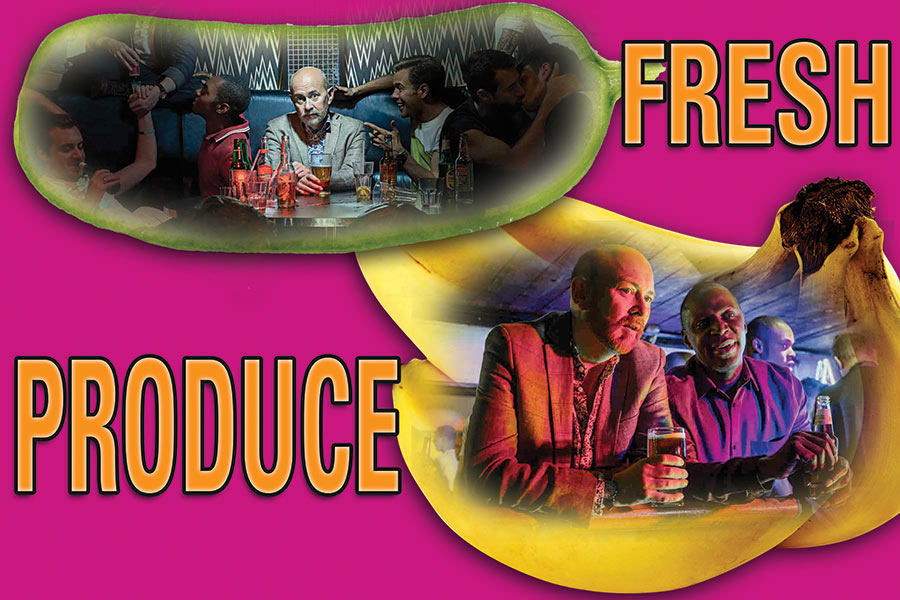“Queer As Folk” creator Russell T. Davies is bringing two new interwoven gay dramas from across the pond with “Cucumber” and “Banana,” which are currently airing on Logo.
Both revolve around modern gay life in Manchester, England: The hour-long “Cucumber” explores the lives and misadventures of Henry Best and his long-suffering boyfriend of nine years, Lance Sullivan, while the half-hour “Banana” follows the individual lives of younger characters on the periphery of Henry’s world.
Actor Vincent Franklin, who plays Henry, said “Cucumber” treads into more mature subject matter and darker territory than “Queer As Folk.”
“When you’re in your early 20s with the whole of your life stretching out in front of you, it’s really fun,” Franklin said about the difference between “Cucumber” and “Queer As Folk.” “When you make mistakes and in that moment you might feel that it’s disastrous and that your world is collapsing, you sort of know that you have time to put things right. But when you are in your late 40s, the stakes are a lot higher. It feels like it’s your last roll of the dice. While there’s something very joyous about ‘Queer As Folk,’ what this is about is being middle-aged and foolish and, as a result, while it’s hysterical and brutally honest, everything is more serious and darker in its tone than ‘Queer As Folk’ was and the characters in it are a little bit more rounded.”
Franklin said the “Cucumber” characters have been a bit more “battered by the elements” than those in “Queer As Folk.”
While on the surface Henry appears to have a happy life — a comfortable life and a good job — he has a history of failed relationships and a pervasive insecurity that continues to affect him.
“Deep down inside he’s still not happy with who he is and he still hasn’t come to terms with that,” Franklin said. “Everyone in ‘Queer As Folk’ is in some way, shape or form beautiful and energized, and I loathe them all. Henry is bald and bearded. He’s very clever but he’s not a happy man.”
Franklin clarified that he doesn’t actually loathe the characters on “Queer As Folk” as much as he envies them for their aesthetic.
“I was born 45 years old, fat and bald,” he joked. “I’ve always had an issue with good-looking actors. When I was in drama school, I played people’s dads and they were actually five years older than me. And nobody batted an eyelid. Everyone thought, Yes, he looks like their dad. So when I say, ‘They’re all beautiful,’ I’m only being cynical and middle-aged and Henry-like looking at them.”
Franklin added that “Queer As Folk” was groundbreaking in its mainstream appeal, and that “Cucumber” continues that evolution.
“‘Queer As Folk’ is about young people and has an optimism and energy about it. It broke the mold over here. It meant that straight people are watching a drama about gay characters, which they had never done before. It wasn’t just massively popular with the gay community. It was popular across the board,” he said. “As a result, it changed the way people felt about the gay community over here in a way that no drama has done. And having done that, there’s now the opportunity to bring in … you know, not every gay man is beautiful. Some gay men are old, cynical, twisted and bored.”
Don’t fret too much. There are some younger, pretty characters floating around in “Cucumber” and taking center stage in “Banana.”

Franklin said having the two separate series is necessary because it keeps the main story in “Cucumber” more focused.
“’Cucumber’ is a novel,” Franklin said. “It’s a big, long story about a middle-aged man and his partner. It focuses on both characters. And often, in a story in a novel, we meet characters that there is no time to explore fully. What Russell has done is say, ‘Here’s all these characters that we’ve run into briefly in “Cucumber.” Let’s give them an opportunity. Let’s look at these individual portraits for half an hour to tell tiny, individual stories, all highly focused on one character.’ They tend to be younger and sexier than the characters in ‘Cucumber.’ What it allows us to do is concentrate on ‘Cucumber’ on that central relationship, but allows us to fill in the details.”
Aside from the wide age demographic, “Cucumber” and “Banana” feature some of the most diverse casting you will see on TV, gay or straight, on either side of the Atlantic.
“People talk a lot about how this is a show that really explores the gay community,” Franklin said. “But I think one of the things people haven’t talked about enough is the fact that this is the most culturally diverse cast I’ve been a part of. No one has really talked about the fact that the relationship Henry and Lance are in is a relationship between a black second-generation guy and a white guy. What is so brilliant about the show is that the cast is sexually and culturally diverse. It has Asian people, Chinese people, Afro-Caribbean people; it’s absolutely a representation of modern Britain. I would have the worst teeth of any actor on American television. You just don’t have guys that look like me unless we are playing a Bond villain. One of the things that is brilliant about the show is that it really is a representation of the United Kingdom and our culture over here. It celebrates that.”
When viewers first meet Henry and Lance, the couple is not in a happy place in their relationship and things get worse in a darkly comic way by the end of the first episode. Henry said the audience shouldn’t expect a storybook ending for the lead characters.
“Russell won’t compromise these characters just to give the audience what they expect,” he said. “There will be some fantastically shocking and honest moments that the audience will not be expecting. But I promise people they will not be disappointed.”
Franklin added that, unlike American television series, “Cucumber” isn’t trying to drag these characters’ stories out for as long as people are willing to watch. Instead, the stories have a definite conclusion.
“There is a big movement over here for the long haul and that comes off the back of all those American series we’ve adopted and love over here,” he said. “Russell had the idea for this series 10 years ago. It’s a story he really wanted to tell and it’s a story with a beginning, a middle and an end. Many writers who don’t have the respect that Russell has in the industry would have had to go to a company and go, ‘This is how we can make series two, series three and series four from it.’ I think what is brilliant about this is that it’s a complete story and, at the end of it, we all walk away. As an actor, it’s breaking my heart but for the audience it means that it’s not compromised. By the time you get to the last third of the series, we are setting up the next one. It’s like a really good meal: It’s really satisfying and you shouldn’t come away from a great meal thinking maybe there’s another course. It’s perfect as it is.”
“Cucumber” and “Banana” air Mondays starting at 10 p.m. on Logo. For more information, visit www.logotv.com.
